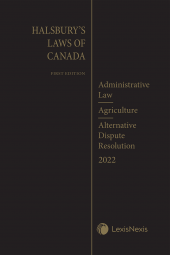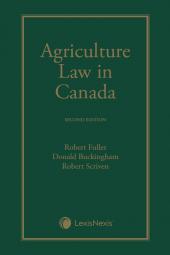Agriculture Law in Canada, 2nd Edition
One Year Subscription Only Terms
Subscribers receive the product(s) listed on the Order Form and any Updates made available during the annual subscription period. Shipping and handling fees are not included in the annual price.
Subscribers are advised of the number of Updates that were made to the particular publication the prior year. The number of Updates may vary due to developments in the law and other publishing issues, but subscribers may use this as a rough estimate of future shipments. Subscribers may call Customer Support at 800-833-9844 for additional information.
Subscribers may cancel this subscription by: calling Customer Support at 800-833-9844; emailing customer.support@lexisnexis.com; or returning the invoice marked 'CANCEL'.
If subscribers cancel within 30 days after the product is ordered or received and return the product at their expense, then they will receive a full credit of the price for the annual subscription.
If subscribers cancel between 31 and 60 days after the invoice date and return the product at their expense, then they will receive a 5/6th credit of the price for the annual subscription. No credit will be given for cancellations more than 60 days after the invoice date. To receive any credit, subscriber must return all product(s) shipped during the year at their expense within the applicable cancellation period listed above.
Détails des produits
Introducing the second edition of Agriculture Law in Canada the only Canadian treatise on agricultural law offering comprehensive, national coverage of the legal issues facing this critical industry. Farming and its related industries have undergone many changes since the first edition was released in 1999. This new edition has been significantly updated to reflect the statutory and case law developments of the past 20 years.
New In This Edition
This revised edition of Agriculture Law in Canada offers a thoroughly updated examination of the major topics in this practice area. In addition to providing an analysis of developing case and statutory law – as well as new tips, tricks and considerations that have become relevant since the first edition was released – this publication features completely revised and updated chapters and sub-sections on:
- The agreement of purchase and sale, with new jurisprudence and legislation, as well as a range of topics related to transactions, including special concerns and due diligence, personal property security legislation, conservation authorities, septic tanks, hydro easements, mineral and timber rights, zoning by-laws and work orders, environmental considerations, navigable waters and marketing board quotas
- Leasing, including wind and solar energy leases, farm agricultural leases, farm residential leases and the general principles of residential tenancy legislation
- Public control of farm land, which explores three broad themes of land use, including severance and division of farm land, as well as the legislation designed to balance farming and non-farming practices through the protection of what constitute normal farming practices and the increasingly relevant role of conservation authorities
- Business organization of farm operations, including the pros, cons and considerations of a sole proprietorship, partnership, corporation and co-operative corporation
- Farm financing, including financing under the Bank Act and Personal Property Security Act, and government financing for agriculture
- Employment law, including pay equity legislation and new jurisprudence on whether workers are employees or independent contractors, particularly in the context of an animal welfare case
- Liability on a farm, including nuisance, negligence, trespass, occupiers’ liability, vicarious liability and the Rylands v. Fletcher rule for strict liability
- Regulating production and sales of agricultural products, particularly in light of the elimination of the Canadian Wheat Board and changes to supply management since the publication of the text’s first edition
- Constitutional law, as played out through division of powers and Charter application to farm management and regulation
- Farm succession and estate planning, with specific attention paid to matrimonial issues, marriage contracts, insurance and other practical considerations
- Termination of a farm operation through sale, dissolution, insolvency and bankruptcy
- Taxation of farming, whatever its corporate form
In addition, a new chapter in the book is dedicated to a discussion of the trade agreements recently completed by Canada and their effects on Canada’s agriculture and agri-food industry and more generally on agricultural trade, including agreements with countries in Europe, the Pacific Rim and North America.
Highlights of This Publication
Agriculture Law in Canada, 2nd Edition also provides an up-to-date analysis of a range of issues affecting farming in Canada, including:
- Rollovers available on the transfer of farming assets
- Potential matrimonial claims of a non-farming spouse
- Banks’ ability to enforce a section 427 security
- What will constitute “due diligence” by a farmer in proceedings under an environmental statute
- How “dumping” of low-priced agricultural products by foreign competitors can be remedied
- How the federal Farm Debt Mediation Act operates in practice
- Specific rules governing the sale and distribution of eggs, wheat and milk
- Why financial statements are unlikely to be sufficient to value the shares in a farm corporation
- When a crop share will be considered farming income to the landlord as opposed to rent
- Special income tax rules that apply to the sale of farm residences
- Alternative courses of action available to an insolvent farmer
An Essential Resource
As the only authoritative text on this topic, Agriculture Law in Canada, 2nd Edition will be an invaluable guide for anyone involved in the farming industry, including:
- Lawyers in private practice and in-house counsel who are in need of a practical and comprehensive reference on agricultural law
- Students and Professors – particularly ones at Canada’s premier agricultural universities in Ontario and on the Canadian Prairies – who will benefit from the relevant, up-to-date content
- Government lawyers, as well as rural municipalities and local governments, who need guidance on compliance/enforcement and relevant legislation
- Members of the Canadian Association of Farm Advisors (CAFA) and other non-legal professionals, such as accountants and agriculture account managers in banks and credit unions, who provide services to the agriculture sector
- Law libraries that want to provide valuable resources for their patrons
Table des matières
Chapter 1: Ownership
(1) Agreement of purchase and sale
(2) Transactions – special concerns and due diligence
(3) Leasing
Chapter 2: Public control of farm land
(1) Introduction
(2) Land use planning legislation
(3) Environmental legislation
(4) Farming and Food Production Protection Act
Chapter 3: Business organization of farm operations
(1) Introduction
(2) Sole proprietorship
(3) Partnership
(4) Corporation
Chapter 4: Farm financing
(1) Introduction
(2) Financing under the Bank Act
(3) Financing under the provincial Personal Property Security Act
(4) Government financing for agriculture
Chapter 5: Employment law
(1) Introduction
(2) Employment of employees
(3) Termination of employment
(4) Pay equity legislation
Chapter 6: Liability on the farm
(1) Introduction
(2) Risks and regulation of specific farm practices
(3) Protecting the farm
(4) Estate litigation
(5) Animal welfare
Chapter 7: Regulating production and sales of agricultural products
(1) Constitutional basis for regulating production and sales of agricultural products
(2) Legislation affecting agricultural production
(3) Agricultural product standards legislation
(4) Agricultural product marketing regulation
(5) Marketing schemes
Chapter 8 : Government powers over agriculture, products of agriculture and trade
(1) Section 95 concurrent powers over “laws in relation to agriculture”
(2) Section 91 and other federal powers
(3) Section 92 provincial powers
(4) Charter of Rights and Freedoms
(5) Canadian Free Trade Agreement
(6) International trade agreements
(7) Domestic trade law
Chapter 9 : Farm succession and estate planning
(1) Introduction
(2) Taxation on death
(3) Passing down the farm
(4) Matrimonial issues
(5) Insurance
(6) Practical considerations in succession planning
Chapter 10: Termination of a farm operation
(1) Introduction
(2) Sale of the farm business
(3) Dissolution of general partnerships
(4) Dissolution of limited partnerships
(5) Dissolution of corporations
(6) Insolvency and bankruptcy
(7) Farm Debt Mediation Act
(8) Other considerations
Chapter 11: Taxation of farming
(1) What is farming?
(2) The business of farming
(3) Why is farming important?
(4) Restricted farmers
(5) Computation of income
(6) Inventory adjustments
(7) Land improvements
(8) Personal consumption and barter transactions
(9) Farming entities
(10) Tax incentives and special treatment provisions
(11) Payments under farm programs
(12) Quotas and other intangibles
(13) Taxation on sale of farming operations
(14) Replacement property
(15) Family farm corporation or family farm partnership
(16) Becoming a non-resident
(17) Commodity and land taxation
(18) Tax planning and tax savings
(19) Tax on split income
Produits liés
-
 Halsbury's Laws of Canada – Administrative Law (2022 Reissue) / Agriculture (2022 Reissue) / Alternative Dispute Resolution (2022 Reissue)Date de sortie: July 29, 2022335,00 $
Halsbury's Laws of Canada – Administrative Law (2022 Reissue) / Agriculture (2022 Reissue) / Alternative Dispute Resolution (2022 Reissue)Date de sortie: July 29, 2022335,00 $ -
 Halsbury's Laws of Canada – Firearms, Weapons and Explosives (2022 Reissue) / Fires (2022 Reissue) / Food (2022 Reissue) / Gifts (2022 Reissue)Date de sortie: October 24, 2022335,00 $
Halsbury's Laws of Canada – Firearms, Weapons and Explosives (2022 Reissue) / Fires (2022 Reissue) / Food (2022 Reissue) / Gifts (2022 Reissue)Date de sortie: October 24, 2022335,00 $ -
 Code criminel et lois connexes annotés, édition 2025 (Volume 1) + Guide du praticien (Volume 2) + Livre électroniqueDate de sortie: August 13, 2024175,00 $
Code criminel et lois connexes annotés, édition 2025 (Volume 1) + Guide du praticien (Volume 2) + Livre électroniqueDate de sortie: August 13, 2024175,00 $
 Lexis Nexis
Lexis Nexis 